|
|
|
Sort Order |
|
|
|
Items / Page
|
|
|
|
|
|
|
| Srl | Item |
| 1 |
ID:
131931
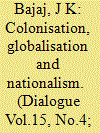

|
|
|
|
|
| Publication |
2014.
|
| Summary/Abstract |
Globalization is a product of the so-called age of European enlightenment. As soon as the Europeans came across the sail, the compass and the gun-power, they put the three together on ships and boats and embarked upon voyages of discovery and conquest. The nature and intent of these voyages may be inferred from the proclamation made by king Henry VII of England in 1480, at the very beginning of this age, granting to one john Cabot and his sons, 'and to the heirs and deputies of them, full and free authority, faculty and power to sail to all find, discover and investigate whatsoever island, countries, regions or provinces of heathens and infields, in whatsoever part of r=the world placed, which before this time were unknown to all Christians'.
|
|
|
|
|
|
|
|
|
|
|
|
|
|
|
|
| 2 |
ID:
132116
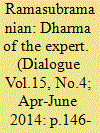

|
|
|
|
|
| Publication |
2014.
|
| Summary/Abstract |
The advent and domination of modern technology today extends from our daily domestic use all the way to national defence and international communications.
However, whenever the questions are posed about the modern technology such as the nuclear power plant in Koodankulam or the introduction of genetically modified crops, we find that even the best among us don't have a framework or approach that is clear and easy to understand. Question such as: what is the limit to the usage of modern technology? How do we measure its benefits as against its harms? And more importantly, when to reject modern technology? Are not always eliciting a clear response from intellectuals, leaders and even scientist and technocrats. We find that they are unable to balance their professional interest against the common interest for humanity.
|
|
|
|
|
|
|
|
|
|
|
|
|
|
|
|
| 3 |
ID:
131961
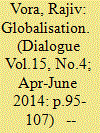

|
|
|
|
|
| Publication |
2014.
|
| Summary/Abstract |
In the definition of civilization, Gandhiji calls a civilization, "civilization" which lays the path of knowing oneself. The path, thus of seeking self knowledge being and must be unique for each individual, group, community and nation according to their Law of Being swadharma. From the path that one follow, one derives one's identity in society.
|
|
|
|
|
|
|
|
|
|
|
|
|
|
|
|
| 4 |
ID:
131945


|
|
|
|
|
| Publication |
2014.
|
| Summary/Abstract |
There is a beautiful story called "Fidelity" by writer- farmer Wendell Berry from US. It brilliantly bring out the distinction between patriotism and nationalism- desh bhakti or desh prem and rashtra bhakti. The story is about how nationalism is at the cost of patriotism and how nation State has ruined the more relaxed village life and family life. The difference is important. The very idea of a nation or rashtra is intrinsically linked with the constitution.
|
|
|
|
|
|
|
|
|
|
|
|
|
|
|
|
| 5 |
ID:
132090
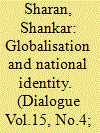

|
|
|
|
|
| Publication |
2014.
|
| Summary/Abstract |
The issues of modernity, globalization or national identity are hardly new. Depending on the context it can be located in European debates even two centuries ago. In our country too it can easily be seen a hundred year ago in the writings of sri Aurobindo, Tagore, Gandhi and many others. The, point however, is that under similar term the content of the dialogue and discussion undergo a great change with a passage of time. Some time even a fundamental change takes place, even though the term remains the same. For instance, the issue and concern discussed under 'modernity' six decade ago can no longer be found in the debates today. Therefore, it would be a fruitful exercise if our current concerns are outlined about modernization, globalization and national Identity.
|
|
|
|
|
|
|
|
|
|
|
|
|
|
|
|
| 6 |
ID:
131937
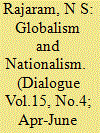

|
|
|
|
|
| Publication |
2014.
|
| Summary/Abstract |
Globalization is not new. But failure to develop a national identity after independence has left the Indian Youth confused and vulnerable to the negative aspect of foreign influence more than assimilation of the positives. In India this is seen in the persistence of mental colonization long after colonial rule has ended.
|
|
|
|
|
|
|
|
|
|
|
|
|
|
|
|
| 7 |
ID:
132084
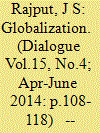

|
|
|
|
|
| Publication |
2014.
|
| Summary/Abstract |
Some fifty years ago the technocrats of those times organized an exhibition in the world fair of New York dedicating it to man's achievement on a shrinking globe in an expanding universe'. Celebrated science fiction writer Isaac Asimov visited this exhibition. Highly excited, he wrote an article about how the world would be 50 years on; in 2014. He wrote: 'communication will become sight-sound and you will see as you will hear the person you telephone. The screen (of the phone) can be used not only to see the people you call but also for studying document and photograph and reading passage from the books'.
|
|
|
|
|
|
|
|
|
|
|
|
|
|
|
|
| 8 |
ID:
132108
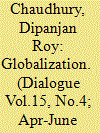

|
|
|
|
|
| Publication |
2014.
|
| Summary/Abstract |
Globalization is the process of international integration arising from the interchange of world views, product, ideas, and other aspect of culture. Advances in transportation and telecommunications infrastructure, including the rise of the telegraph and its posterity the internet, are major factors in globalization, generating further interdependence of economic and culture activities. Through scholars place the origins of globalization in modern times, other trace its history long before the European age of discovery and voyages to the new world. Some even trace the origins to the third millennium BCE. The term globalization has been increasingly used since the mid 1980s and especially since the mid 1990s.
|
|
|
|
|
|
|
|
|
|
|
|
|
|
|
|
| 9 |
ID:
132099
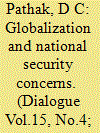

|
|
|
|
|
| Publication |
2014.
|
| Summary/Abstract |
It is not adequately appreciated that there was an unprecedented transformation of the world in the beginning of the Nineties in term of both geopolitics and economy with the result that strategic analysts are still struggling to assess the long range impact of what certainly was a sudden transition to the age of 'globalization'. Interestingly, the year 1991 will go down in history as the common cut off point for this two prong leap to a new world order. Following the success of the anti Soviet Armed campaign in Afghanistan, the politburo of the communist Party of Soviet Union (CPSU) met for the last time in April that year to discard 'democratic Centrism; and confirm the end of international Communism and the demise of the USSR as a super power.
|
|
|
|
|
|
|
|
|
|
|
|
|
|
|
|
| 10 |
ID:
131839


|
|
|
|
|
| Publication |
2014.
|
| Summary/Abstract |
The verb roil means to make a liquid by disturbing the sediment a roiler is one who does this. Lately, we have had a fair number of our lawmarkers of the ruling political party in Assam doing just this. They have stirred what had become the sediment of an inactive political party so that the liquid itself has become turbid. But as well as know, when someone does this, the sediment settles down again after a while so that we are back to square one. This is precisely what seems to have happened to the Congress in Assam. The interesting part we have more roilers than rulers in the State congress today.
|
|
|
|
|
|
|
|
|
|
|
|
|
|
|
|
| 11 |
ID:
132216
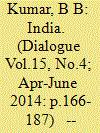

|
|
|
|
|
| Publication |
2014.
|
| Summary/Abstract |
Our discourse on 'National Integration' in post-independence India, and the related issues and challenges, is often shrouded in confusion and haziness. Myths and misinterpretation of our history, culture and religion abound even after independence. This is precisely because of the multiple lack syndromes of our scholarship, which continues to be basically colonial and Marxist; it dogmatically resists change in old perceptions. This is because the British believed, as Churchil once said that 'the empires of the future are the empires of the mind'. Macaulay planned the battle of mind, at least a century earlier, than the above statement of Churchil.
|
|
|
|
|
|
|
|
|
|
|
|
|
|
|
|
| 12 |
ID:
131853


|
|
|
|
|
| Publication |
2014.
|
| Summary/Abstract |
I wish to confess to my friend who have a misconception that I am a very knowledgeable person, that it is not true. Whatever I say is probably based forty percent on knowledge and the rest is information. Anything claimed on the basis of information is not true knowledge. My friend Pawanji differentiation between knowing and believing/ assuming'. It is a fundamental differentiation. We know very little. Mostly it is what we believe in, and yet we claim that we are logical and not superstitious.
|
|
|
|
|
|
|
|
|
|
|
|
|
|
|
|
| 13 |
ID:
131844
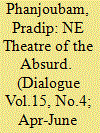

|
|
|
|
|
| Publication |
2014.
|
| Summary/Abstract |
Writing of Manipur and the Northeast, especially by those of us who belong here and, therefore, fit in the category of what psychoanalysts have come to refer to as the subject in analysts position, has never been easy. We run in to many self inhibiting hurdles, and among these is the forbidding shame of telling life experiences which we are aware others will find difficult to not only understand or empathize, but believe.
|
|
|
|
|
|
|
|
|
|
|
|
|
|
|
|
| 14 |
ID:
131948


|
|
|
|
|
| Publication |
2014.
|
| Summary/Abstract |
After independence, in spite of a very fine Constitution and the presence of leaders like Gandhi, India took a sudden turn towards accepting model of socialism as understood by the Soviets. Thus from being a country which suffered from British colonial policies it became some kind of socialist country. Great chess player Gary Kasparov once said: India is a communist country with only all its disadvantage and no advantage. That was right we lost the chance to gain economic, political and many other momentums that we should have as be progressed away from colonialism.
|
|
|
|
|
|
|
|
|
|
|
|
|
|
|
|
| 15 |
ID:
132123
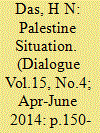

|
|
|
|
|
| Publication |
2014.
|
| Summary/Abstract |
The mind-boggling politico-military situation in Israel and Palestine struck me as inscrutable when I toured the region during November 10-21, 2012, which almost coincided with the Gaza rocket-war that raged between November 14 and 21, 1012. The war caused much human tragedy and loss of property. A total of 174 were killed in the Gaza wing of Palestine and 5 in Israel. Gaza city was devastated. Many building in south Israel were affected. I saw some of the action as well as the damage. The Gaza war did not exactly occur as a sudden eruption of anger.
|
|
|
|
|
|
|
|
|
|
|
|
|
|
|
|
| 16 |
ID:
131850
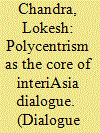

|
|
|
|
|
| Publication |
2014.
|
| Summary/Abstract |
The twentieth century was wrapped in gold plundered from a thousand flowers. It was consumerism at its height. It clothed the mind with physicality. This century seeks inner steppes, immense and pristine. We have to work out a journey to the innermost substance of being. People of Asia have to enshrine their vision and value in ever-creating, all-irradiating forms. We have to avoid to avoid the tragedy of becoming non-descript and monocentric, deprived of roots.
|
|
|
|
|
|
|
|
|
|
|
|
|
|
|
|
| 17 |
ID:
131898


|
|
|
|
|
| Publication |
2014.
|
| Summary/Abstract |
Two powerful concepts have been, of late, invading the world-mind as it were: 'Globalisation' and 'New Millennium'. Both are western concepts, having tremendous potential not only to influence the thinking of the non-western world but also to undermine the culture, social and economic independence in these regions. Globalization is not a totally new idea, at least for India; but in its present form, it is vastly different from its older counterparts. India always had the vision of the whole world as essentially one.
|
|
|
|
|
|
|
|
|
|
|
|
|
|
|
|
|
|
|
|
|